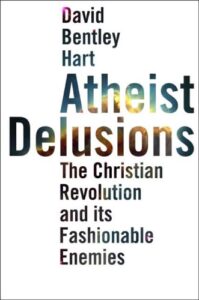
I recently read and enjoyed David Bentley Hart’s, Atheist Delusions, especially after I had subjected myself to Richard Dawkins’, God Delusion, with quotes like this, “The God of the Old Testament is arguably the most unpleasant character in all of fiction: jealous and proud of it; a petty, unjust, unforgiving control-freak, a vindictive, bloodthirsty ethnic cleanser: a misogynistic, homophobic, racist, infanticidal, genocidal…” (and the quote goes on ad nauseum).
This book is not a direct point-by-point response to men like Dawkins, Daniel Dennet, or Sam Harris. It is a response to their twisted perspective of history which is full of error and logical inconsistency. Mr. Hart writes, “…atheism that consists in vacuous arguments afloat on oceans of historical ignorance, made turbulent by storms of strident self-righteousness, is as contemptible as any other form of dreary fundamentalism.”
One of the reasons I enjoyed this book is because he is honest and doesn’t gloss over or explain away the failures of previous Christians through the centuries. Yet, he is very ruthless when he takes on the myths of popular culture that regurgitate the lies of men like Richard Dawkins who make Christianity responsible for plunging the Western world into a millennium of mental squalor (i.e., the “Dark Ages”).
One example is a quote from Jonathan Kirsch’s book, God Against the Gods, in which he describes a Christian mob attacking the ancient library of Alexandria and scorching all its books, the loss to Western civilization of which is beyond calculation or even imagination. Mr. Hart says of this myth, “…obviously he [Kirsch] is repeating in good faith a tale he has heard so often that he cannot distinguish it from fact. But it is quite absurd for all that.” Mr. Hart then goes on to show what really historically happened. Throughout this book he deconstructs those kind of lies and myths aimed at the Christian faith.
I’m thankful for men like David Bentley Hart who defend our faith against “today’s gadflies [who] seem far lazier, less insightful, less subtle, less refined, more emotional, more ethically complacent, and far more interested in facile simplifications of history than in sober and demanding investigations of what Christianity has been or is.”